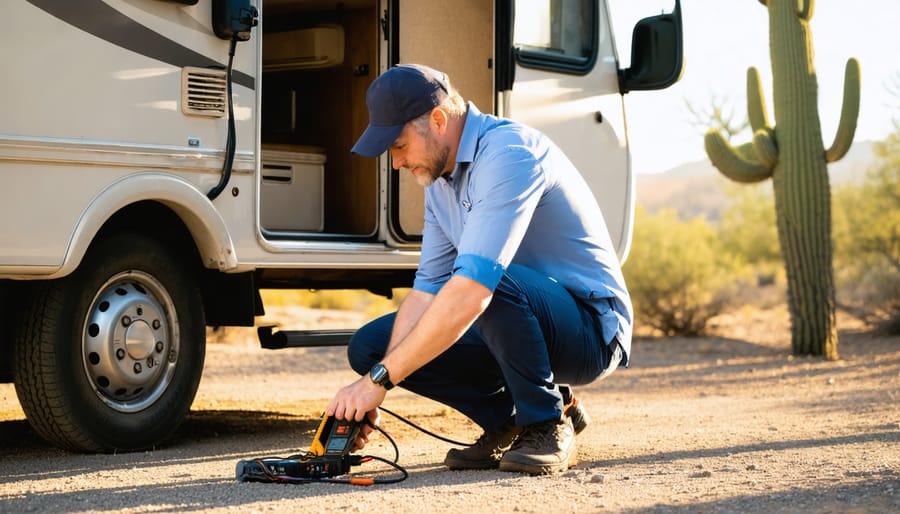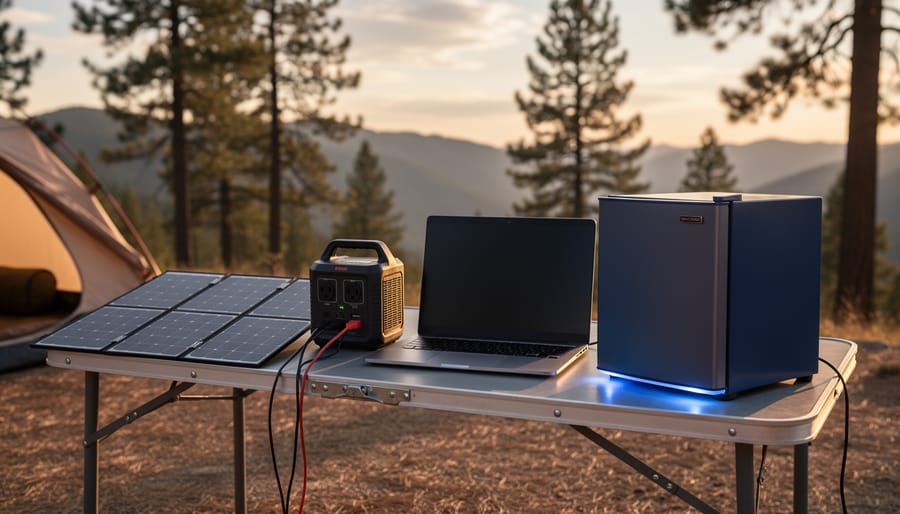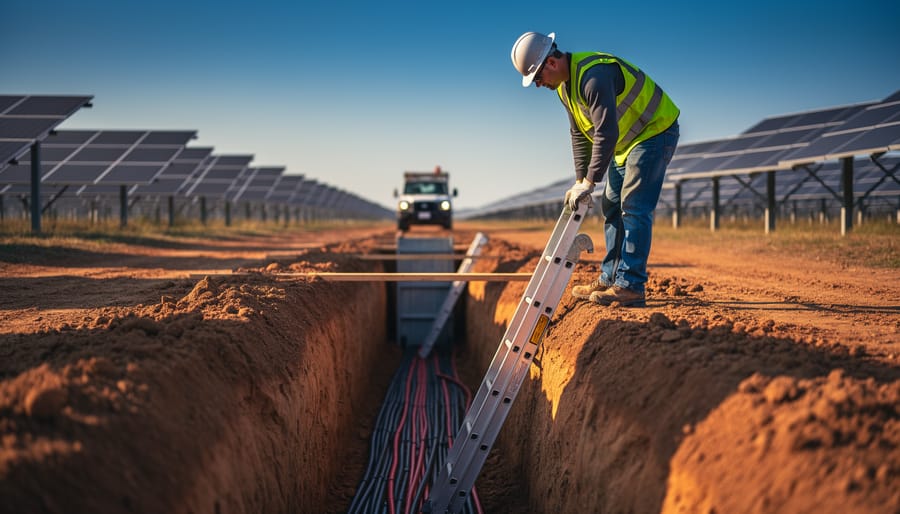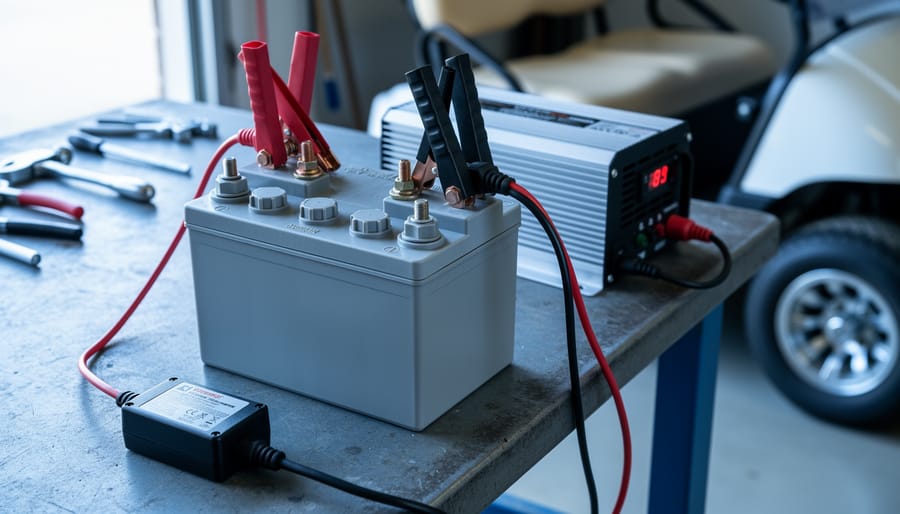What Size Generator Do I Need for My RV?
Updated:

To determine the appropriate generator size you need for your RV, calculate your electrical requirements and choose a unit that meets those needs without excessive capacity.
This article will discuss the importance of selecting the right generator size and a step-by-step guide on how to size your RV generator, with a special focus on solar generators.
How to Size an RV Generator

Figuring out the right size of your RV generator depends on how much power the RV needs.
Here are the steps you can follow to determine your RV’s electrical power requirements and the generator size you need:
List Your Appliances
List all the AC appliances and devices you need to run in your RV. This includes essentials like:
- RV air conditioner
- RV heater
- Microwave
- Refrigerator
- Coffee maker
- Induction cooktop or electric skillet
- Televisions and other electronics
Don’t forget small items like phone and laptop chargers that add to your power needs.
Determine Wattage Ratings
Next, find the rated wattage of the AC devices you plan to use. Check appliance manuals or labels for:
- Rated or running watts used while operating
- Surge or starting watts needed at start-up
When first turned on, many appliances require extra surge watts for a few seconds. Surge watts can be 2-3 times higher than running watts.
If your RV air conditioner is 15,000 BTU, it likely needs around 3000 surge watts and 1500 running watts.
Estimate Your Electrical Load
Add up the rated watts of devices you plan to run simultaneously to estimate your peak power load.
If you’ll use the AC, microwave, and TV at the same time, that could be:
- Air conditioner: 3000 surge watts, 1500 running watts
- Microwave: 1000 watts
- TV: 500 watts
Your estimated peak load is 4500 watts.
Add a Safety Factor
As a rule of thumb, multiply your estimated peak watts by 1.2 to add a 20% safety cushion.
For our example above,
\(4500\ watts * 1.2 = 5400\ watts \)
Round up to choose a 5500W or larger generator.
This prevents overload while allowing for future electrical increases like added appliances.
Choose a Generator Sized for Your Peak Needs
You will need at least a 5500-watt generator to handle the peak demand comfortably.
Solar Generators For RVs

Solar generators are an emerging option for RV power supply. They utilize solar panels, batteries, and inverters to generate renewable energy
Here’s an overview:
- Solar panels capture energy from the sun to generate electricity, converting it to 12V DC.
- A charge controller regulates solar panel output to charge the batteries safely.
- Batteries store electricity generated from the sun in battery banks. Lithium batteries are common.
- Inverters convert 12V DC current into 120V AC power like a home outlet for appliances. Pure sine wave inverters offer clean electricity.
- Displays and apps show battery levels, wattage usage, and other system info.
Larger units have a capacity exceeding 2000 watt-hours and rival small gas generators. Expandable batteries and solar panels boost capacity.
Solar generators provide silent, eco-friendly power but rely on sufficient sunlight. Cloudy weather can limit solar recharging.
Pros and Cons of Solar Generators
Solar generators can be a viable option for powering RVs in certain situations, but they may not be the best choice for all RVers. Some key pros of solar generators include:
- Silent Operation – No engine noise since they’re powered by the sun.
- Eco-Friendly – No emissions.
- Off-grid Capable – Can recharge via solar or shore power.
- Safe – No carbon monoxide risk when used indoors.
However, solar generators also have some downsides for RV use:
- Expensive Initial Cost – But can pay off long term.
- Limited Peak Capacity – Hard to run high-draw appliances like ACs.
- Charging Dependent on the Sun – Need good weather and sunlight exposure.
When Are Solar Generators Best for RVs?
Solar generators shine in certain RV scenarios:
- Ultra-light Camping – A <100 lb solar generator provides ample power without the weight for tent camping, hiking, or travel trailers.
- Boondocking – Solar energy lets you camp anywhere without fuel. Panels recharge the generator for free power.
- Emergency Power – As a backup for essentials when shore power fails.
- Reduce Generator Runtime – Use solar to charge batteries daily and conserve fuel.
- Sensitive Areas – Solar generators produce no noise or exhaust for a small eco-friendly footprint.
- Short Trips – A solar generator can minimize generator needs for weekends or short trips.
Solar generators can meet many electrical needs and reduce reliance on noisy, high-maintenance traditional generators for RV owners who only occasionally need power.
Picking Between Solar and Gas or Diesel Generators

Choosing between solar vs gas generators depends on several factors:
- Power Requirements – Gas generators are great for appliances like A/C needing 2000+ watts.
- Camping Style – Solar suits remote locations, while gas is best for RV parks.
- RV Type – For big motorhomes demanding more power, gas is a better choice. For smaller camper vans, consider solar.
- Weather Conditions – In areas with abundant sunlight, a solar generator thrives. In less sunny conditions, go with gas.
- Noise Tolerance – If you prefer peace and quiet, solar is the way. If noise isn’t a big concern, gas works.
- Budget – Invest in solar if you’re okay with a higher initial cost. For a more budget-friendly start, choose gas
- Eco-Focus – Solar power is emissions-free and environmentally friendly.
Evaluate your power needs, budget, and how you camp. For light-duty or eco-focused RVers, solar generators can serve a supporting power role.
Sizing a Solar Generator for an RV
Solar generators are sized by their rated power, measured in Watts, and their battery capacity, measured in watt-hours (Wh).
To determine the rated power requirement of your solar generator, follow a similar process as sizing a gas generator:
- List the devices you need to run and their rated watts. Focus on essentials.
- Add the rated watts to determine your daily average load.
- Multiply by 1.2 as a safety factor. This is the minimum solar generator capacity needed.
- Choose a solar generator at or above your calculated capacity.
To determine the battery capacity, follow these guidelines:
- For light loads like charging laptops and phones, a 500Wh capacity is sufficient.
- To run a mini-fridge, fans, and lights, look for 1000-1500Wh.
- For larger devices like a microwave, aim for 2000Wh+.
- Air conditioners require at least a 3000Wh capacity, with 5000Wh better for extended use.
- Factor in the recharge capabilities – more solar panels and shore power charging means faster battery refills.
- Choose solar panels that provide 300-400W and connect multiple panels to recharge sizable battery banks faster. Aim to replenish your daily power usage within 4-5 peak sun hours.
Why the Right Generator Size Matters for RVs
Picking the wrong size generator for your RV can cause problems:
- A small generator risks overload and damage if appliances exceed its capacity.
- A large generator wastes fuel and money if it’s more than you need.
- Undersized units may not even start an RV air conditioner or large appliances.
- Oversized generators are heavier and costlier than necessary.
To properly size your RV generator and choose the right unit, calculate your electrical requirements and buy adequate power without excess capacity.
Pitfalls of the Wrong Generator Size
Using an undersized generator leads to a couple of issues:
- Annoyance of Tripping – If appliances overload the generator, it cannot provide enough power and shut off to protect itself. This leads to annoying power interruptions.
- Failure to Start Heavy Loads – Some generators, like air conditioners, lack the starting watts to power large RV appliances. The AC unit just won’t turn on if the generator is too small.
While it seems like bigger is better, an oversized RV generator causes problems, too:
- Higher Cost – More watts mean a pricier generator. Get the right size to save money.
- Excess Noise – Large generators tend to be louder when running.
- Reduced Portability – More watts usually mean a bulkier, heavier generator.
- Lower Fuel Efficiency – Large generators burn more fuel, even at low power output.
To avoid generator issues, properly calculate your RV’s electrical needs and choose accordingly.
Keeping Generators in Top Shape

Proper generator maintenance prevents breakdowns and keeps your generator fuel-efficient.
Portable Generators
- Change oil regularly per the manual. Check levels monthly.
- Replace spark plugs and air filters per manufacturer’s maintenance schedule.
- Use a fuel stabilizer if storing gasoline for long periods.
- Drain old gas and add new before each trip. Never store with ethanol gas.
- Exercise the generator monthly by running under load for 20-30 minutes.
- Keep the generator sheltered from rain and elements when not in use.
Built-in Generators
- Change oil and filters as specified by the manufacturer.
- Inspect the exhaust system for leaks, damage, or blockages.
- Check belt tension and wear. Replace if worn or cracked.
- Drain the cooling system in winter or before storage to prevent damage.
- Clean and gap spark plugs per maintenance schedule.
- Inspect fuel lines and connectors periodically for leaks or deterioration.
For Solar Generators
- For optimal charging, keep the solar panels clean and clear of dust or debris buildup.
- Check battery capacity monthly. Drain/recharge cycles degrade batteries over time.
- Clean the charge controller and inspect wires to ensure optimal solar input.
- Check for rodent damage to wiring. Mice love nibbling solar wires.
- Keep the generator shaded and dry when not in use for the longest battery lifespan.
- Consider occasional charge controller firmware updates if available.
Regular maintenance makes sure your RV generator performs when you need it most. Paying attention to solar generators ensures optimal solar collection and prevents premature battery failure. Keep both types of RV generators in top shape.
FAQs About RV Generators
How Loud Are RV Generators?
RV generator noise varies widely. Smaller portable inverter generators can be as quiet as 52-59 dB at low speeds. This is about as loud as normal conversation.
Larger portable gas generators typically produce 60-75 dB of noise. This is comparable to a washing machine. Vibration isolation pads can reduce noise.
Built-in RV generators are very quiet due to sound insulation around the compartment. But cheaper models can still be noisy.
Finally, solar generators make virtually no noise since they do not have any mechanical parts.
Can You Run a Generator While Driving an RV?
Some high-end RV models allow you to operate the built-in generator when driving safely. This provides power for appliances and keeps batteries charged without having to stop.
Generator manufacturers have designed vibration isolators and cooling systems that allow smooth operation. Buy, you should never run a portable generator in a moving vehicle.
How Long Will RV Batteries Last Without a Generator?
How long RV batteries last without recharging depends on battery capacity, age, and load. Responsible use allows RV batteries to supply 1-5 days of power.
Lithium batteries hold more usable capacity than lead-acid. Newer batteries also last longer than older ones before needing a recharge from the generator, solar, or other source.
What’s the Best Type of RV Generator?
The best RV generator depends on your power needs and budget. Smaller portable inverter generators and solar generators are best for lighter-duty applications.
Large built-in units work well for motorhomes needing serious power.









